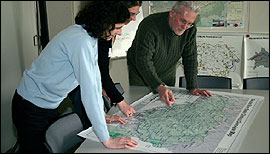 |
Putting public participation into practiceActive involvement on the part of the interested public is an important principle for sustainable water management, and the reason behind the first ICPDR Stakeholder Conference to be held on June 28 and 29. |
 |
To secure the 'good status' of
the Danube River Basin by 2015, it is important to discuss the analysis
of the river basin at the Stakeholder
Conference and not lose the big picture. |
Water is everybody's issue.
Countries are not alone in protecting shared water resources, they need
to cooperate with actors from different sectors. The ICPDR Stakeholder Conference
will provide a forum to discuss basin issues openly and to develop solutions
which will influence the next steps taken at the international level. The
Danube River Protection Convention includes the involvement of the public
in its framework. Today, 11 organisations have taken advantage of this opportunity
and have been granted observer status to the ICPDR.
This approach has been enlarged by the requirements of the EU Water Framework
Directive, which encourages all stakeholders to participate actively in
its implementation. As we all use water in our daily lives and work - whether
it is in a factory, farm or office - it is important to involve each person
accomplishing the objective of the legislation: the achievement of 'good
status' of all water by 2015. Clearly, the participation of the public is
crucial at the national and local level, where numerous actions will take
place in the upcoming years. However the ICPDR, as a platform for coordinating
issues of international importance, must also face this challenge and improve
the dialogue with stakeholders.
Finding solutions together.
In March 2005, the ICPDR finalised the first roof-analysis of the Danube
River Basin, providing a clear overview of the most challenging issues in
the basin. These include the impact of organic pollution and hazardous substances,
the hydromorphological alterations of the main river and its tributaries,
as well as the missing connectivity. But what does this mean? What activities
have and can be started to meet these challenges? What impacts might these
have on the agricultural sector, on inland navigation or energy production?
How can we achieve the balance of interest between the environment and those
who depend on it?
The ICPDR invites all interested groups representing the wide range of stakeholders
to actively participate in the two-day Stakeholder Conference to jointly
develop ideas for the sustainable use of the Danube and its tributaries.
For detailed information about the ICPDR Stakeholder Conference and how
to attend, see www.icpdr.org.